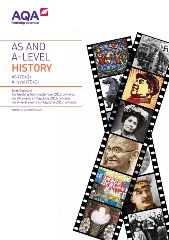2S The Making of Modern Britain, 1951–2007
This option provides for the study in depth of the key political, economic, social and international changes which helped to mould Britain in the second half of the 20th century. It explores concepts such as government and opposition, class, social division and cultural change. It encourages students to reflect on Britain’s changing place in the world as well as the interrelationship between political policies, economic developments and political survival.
Part one: building a new Britain, 1951–1979
The Affluent Society, 1951–1964
- Conservative governments and reasons for political dominance: Churchill, Eden, Macmillan and Home as political leaders; domestic policies; internal Labour divisions; reasons for Conservatives' fall from power
- Economic developments: post-war boom; balance of payments issues and 'stop-go' policies
- Social developments: rising living standards; the impact of affluence and consumerism; changing social attitudes and tensions; class and 'the Establishment'; the position of women; attitudes to immigration; racial violence; the emergence of the 'teenager' and youth culture
- Foreign relations: EFTA and attempts to join the EEC; relations with and policies towards USA and USSR; debates over the nuclear deterrent; Korean War; Suez; the ‘Winds of Change' and decolonisation
The Sixties, 1964–1970
- Wilson and the Labour governments: Wilson's ideology and leadership; economic policies and problems; devaluation; industrial relations; the trade unions; other domestic policies; Labour divisions; the beginning of the 'troubles' in Northern Ireland; the end of post-war consensus; loss of 1970 election
- Liberal reforming legislation: private members' bills and the end of capital punishment; divorce reform; the legalisation of abortion; the legalisation of homosexual relations; educational reform
- Social and cultural change: the expansion of the mass media; growth in leisure activities; the impact of scientific developments; the reduction in censorship; progress towards female equality; changes in moral attitudes; youth culture and the 'permissive society'; anti-Vietnam war riots; issues of immigration and race
- Relations with and policies towards USA, particularly issue of Vietnam; response to world affairs and relations with Europe; decolonisation including 'withdrawal East of Suez' and Rhodesia.
The end of Post-War Consensus, 1970–1979
- Heath’s government: Heath as leader; political and economic policies; industrial relations and the miners' strikes; the 'troubles' in Northern Ireland, including the Sunningdale Agreement
- Labour governments of Wilson and Callaghan: political, economic and industrial problems and policies; problems of Northern Ireland
- Society in the 1970s: progress of feminism; the Sex Discrimination Act; race and immigration; youth; environmentalism
- Britain's entry into and relations with Europe; the state of the 'special relationship' with USA; attitudes to USSR and China
Part two: Modern Britain, 1979–2007 (A-level only)
The impact of Thatcherism, 1979–1987 (A-level only)
- The Thatcher governments: Thatcher as leader, character and ideology; ministers; support and opposition; electoral success; internal Labour divisions and the formation of the SDP; Northern Ireland and the troubles
- Thatcher's economic policies and their impact: monetarism; privatisation; deregulation; issues of inflation, unemployment and economic realignment
- Impact of Thatcherism on society: sale of council houses; miners' strike and other industrial disputes; poll tax; extra-parliamentary opposition
- Foreign Affairs: the Falklands; the 'special relationship' with USA; moves to end the Cold War; Thatcher as an international figure; attitudes to Europe, including Thatcher's policies; divisions within the Conservative Party
Towards a new Consensus, 1987–1997 (A-level only)
- Fall of Thatcher and her legacy; Major as leader; economic developments, including 'Black Wednesday' and its impact; political sleaze, scandals and satire; political policies; approach to Northern Ireland; Conservative divisions
- Realignment of the Labour Party under Kinnock, Smith and Blair; reasons for Labour victory in 1997
- Social issues: the extent of 'social liberalism'; anti-establishment culture; the position of women and race-relations
- Foreign affairs: relations with Europe, including the impact of the Single European Act and Maastricht Treaty; interventions in the Balkans; contribution and attitude to the end of the Cold War
The Era of New Labour, 1997–2007 (A-level only)
- The Labour governments: Blair as leader, character and ideology; constitutional change; domestic policies; Brown and economic policy; Northern Ireland and the Good Friday Agreement
- The Conservative Party: leaders and reason for divisions; reason for electoral failures in 2001 and 2005
- Social issues: workers, women and youth; the extent to which Britain had become a multicultural society
- Foreign affairs: attitudes to Europe; the 'special relationship' with USA; military interventions and the 'war on terror'; Britain's position in the world by 2007
